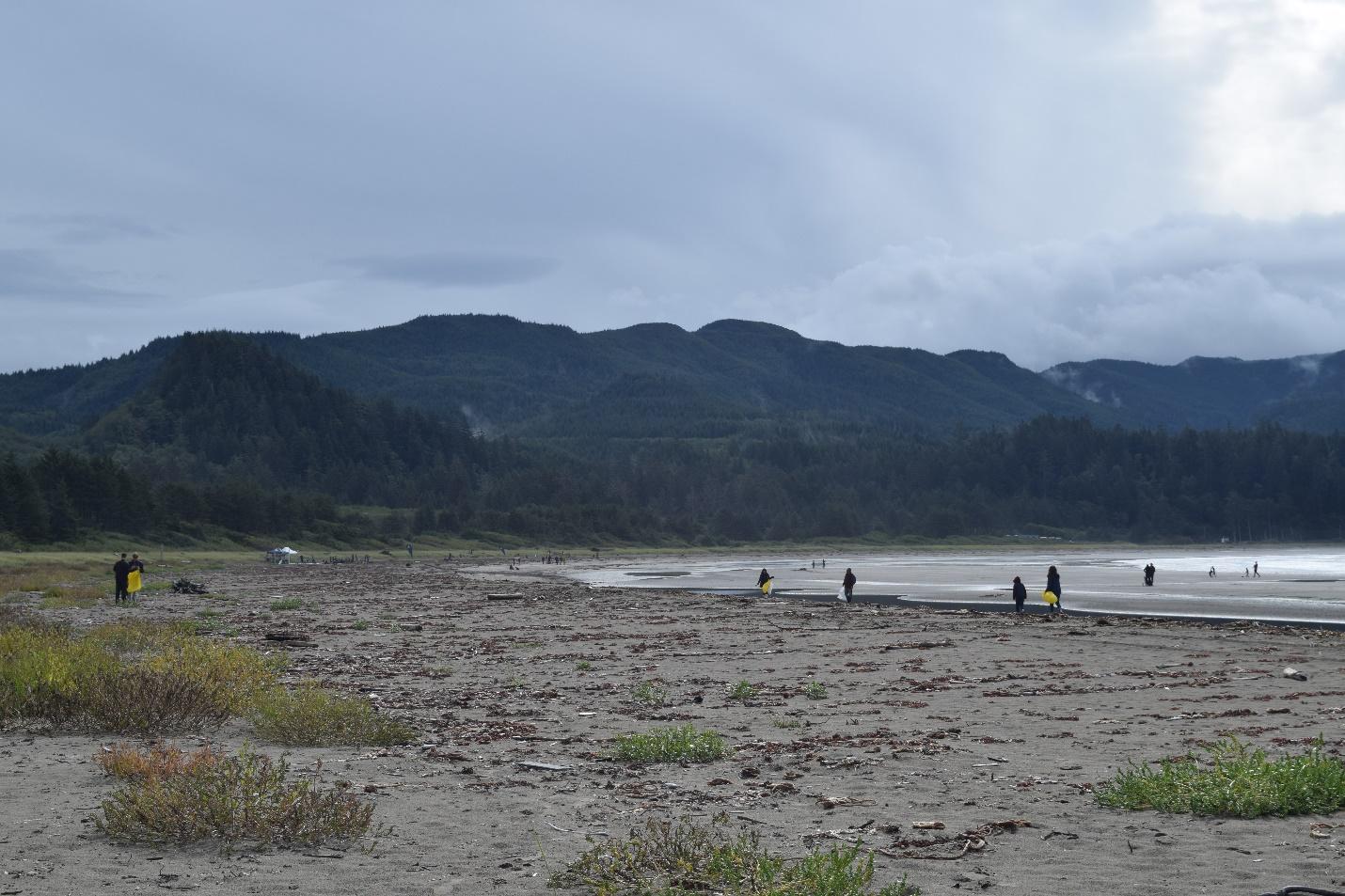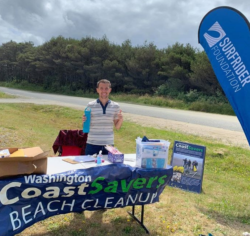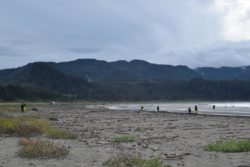
Q&A on the 2020 International Coastal Cleanup

James Roubal at 5th of July Cleanup with Washington CoastSavers
On Saturday, September 19, 2020, the 35th Annual International Coastal Cleanup (ICC) is taking place all around the world. Started almost 30 years ago by Ocean Conservancy, the ICC brings people together to clean up trash in our coastal waters and beaches. And, for many years, Washington CoastSavers have participated in this worldwide movement!
Last September, over 1 million people removed more than 24 million pounds of trash from 25,000+ miles of coastline. More than 800 of those volunteers were from around the Pacific Northwest who participated in protecting Washington’s coast. This year, the cleanup continues following COVID safety guidelines.
James Roubal is the Program Coordinator for Washington CoastSavers and Olympic Coast National Marine Sanctuary Foundation, and he joined us to explain the importance of the ICC and how to get involved.
Washington Coastsavers has been participating in the International Coastal Cleanup for 7 years now. How did WA CoastSavers get involved and how does this support WA CoastSavers’ mission?
WA CoastSavers first got involved in the International Coastal Cleanup through an initial grant awarded by the Ocean Conservancy in 2013. The grant funds were spent on strengthening the capacity of our site coordinators, from agencies like Olympic National Park to Washington State Parks and nonprofits like Surfrider Foundation, to participate in this global effort, whether that was through supplying them with gloves, trash bags, recycling bags, and various dumpsters. This event supports the CoastSavers’ mission of keeping the state’s beaches clean of marine debris through coordinated beach cleanups, education, and prevention efforts.
With cleanups taking place all around the world with different hosts, how does the ICC actually work? And, what part does WA Coastsavers play?
The International Coastal Cleanup kickstarted more than 30 years ago, when communities rallied together with the common goal of collecting and documenting the trash littering their coastline. Today, volunteers from states and territories throughout the U.S. and more than 100 countries come together each year for this global effort. Ocean Conservancy has staff devoted to providing materials to various nonprofit and community leaders who coordinate local cleanups, host webinars focused on their CleanSwell data collection app, which provides researchers and policy-makers with insight about local trash trends to inform solutions, and they host an interactive map on their website where volunteers can learn more about how to get involved in local cleanups.
WA CoastSavers and Puget Soundkeeper Alliance act as the two regional coordinators for the International Coastal Cleanup in Washington State. The two organizations work with dozens of other nonprofits, civic organizations, and government agencies to plug-in thousands of volunteers throughout the Puget Sound, Salish Sea, and Pacific Coast each September.
What steps is the ICC taking this year to be safe during the pandemic?
CoastSavers is encouraging all volunteers to follow all Washington State COVID-19 guidelines. Ocean Conservancy has also released their own set of “Steps for Safety.” Some of these include:
Pick a location where social distancing is possible. Monitor your health before a cleanup of any size.
Volunteers should wear a mask and gloves while cleaning. Additional supplies include hand sanitizer and a reusable water bottle.
Help collect important data on the types and amount of trash you remove during or after a cleaning using the CleanSwell app.
Safely collect trash using gloves. Never pick up sharp or dangerous items.
After you finish collecting items, carefully remove gloves. Wash hands and arms with soap and water for at least 20 seconds.
Follow steps in the CleanSwell app to review and submit your data.
Properly dispose of items collected. Do not place trash bags in overflowing bins.
Immediately wash hands and sanitize any materials used during the cleanup.

2018 International Coastal Cleanup at Hobuck Beach, Washington
Where is the ICC taking place in Washington state?
CoastSavers will be hosting the ICC cleanup at 30+ beaches along the Pacific Coast and Strait of Juan de Fuca for the 2020 ICC. All Olympic National Park, Olympic Coast National Marine Sanctuary, and Makah, Quinault, Quileute, and Hoh tribal beaches are closed for this cleanup in respect of COVID and preventing an outbreak in vulnerable coastal communities. Puget Soundkeeper Alliance will also be hosting cleanups at 15 sites throughout the greater Puget Sound region, including Seattle, Tacoma, and the San Juan Islands.
What’s your favorite part about the ICC?
Hands down working with the volunteers is the highlight of not only the ICC, but my job in general. We have some incredibly dedicated individuals who have been participating in cleaning the Washington Coast since the 1970s – which they proudly bestow as the first organized cleanups on the West Coast. Many families and friends make a tradition of participating in our three annual events. Earlier this year a volunteer told me she’s been bringing her kids to the Earth Day and ICC since they were only two years old. Now they’re grown up and live in France, but make an effort to come home every spring to go camping with their mom and clean the shorelines of the Pacific with CoastSavers.
What part does the Olympic Coast National Marine Sanctuary Foundation play in Washington CoastSavers’ cleanup efforts?
Today, CoastSavers regularly coordinates cleanup programs for the Strait of Juan de Fuca and 157 miles of the outer coast of Washington from Cape Flattery to Cape Disappointment. CoastSavers is made up of an executive committee, a steering committee, and a program coordinator. The National Marine Sanctuary Foundation is the fiscal agent for CoastSavers and provides programmatic support and oversight. Foundation Chapter staff members and Olympic Coast National Marine Sanctuary (OCNMS) staff serve on the executive committee.
CoastSavers is a partner organization with numerous agencies and individuals contributing within the scope of our responsibilities. Olympic Coast National Marine Sanctuary (OCNMS) staff and Washington Service Corps members help organize volunteers at multiple registration stations and organize BBQ events. OCNMS is a founding member of CoastSavers and contributes significantly to the organization’s long-range planning, funding, and event coordination.
Why should people get involved with the ICC and WA CoastSavers? How can they take part?
Participating in the ICC provides an opportunity to make a lasting impact for the coastlines of the Pacific Northwest. Every year, intense storms frequent the Washington coast with heavy rainfall and winds blowing up the coast from the south. These winds drive marine debris from out in the ocean onto the beach, negatively impacting the health of vital marine ecosystems. Plastic water bottles and other items that may break into smaller pieces as they degrade over time can lead to seabirds and other marine life ingesting the plastic, which can have detrimental impacts to their overall health. Additionally, fishing line, nets, rope and other debris may entangle many wildlife species by encircling the animals, which can negatively impact the overall biodiversity in the Pacific Ocean. Lastly, accumulated debris, such as foil packaging, children’s plastic toys, and the usual flotsam and jetsam litter may inhibit critical habitat, like the nesting grounds of vulnerable marine organisms such as the Western Snowy Plover.
If you can’t physically drive to one of the beaches to participate, you can help organize your own community cleanup. You can also keep track of your data on a debris data card and send it to us to let us know what you found. Additionally, you can be a good steward at home by making sure you recycle and compost regularly, reuse items after you’re done using them, and reduce your overall plastic consumption.
Washington CoastSavers is an alliance of partners and volunteers dedicated to keeping the state’s beaches clean of marine debris through coordinated beach cleanups, education, and prevention. Click to learn more about their great work and other cleanups
